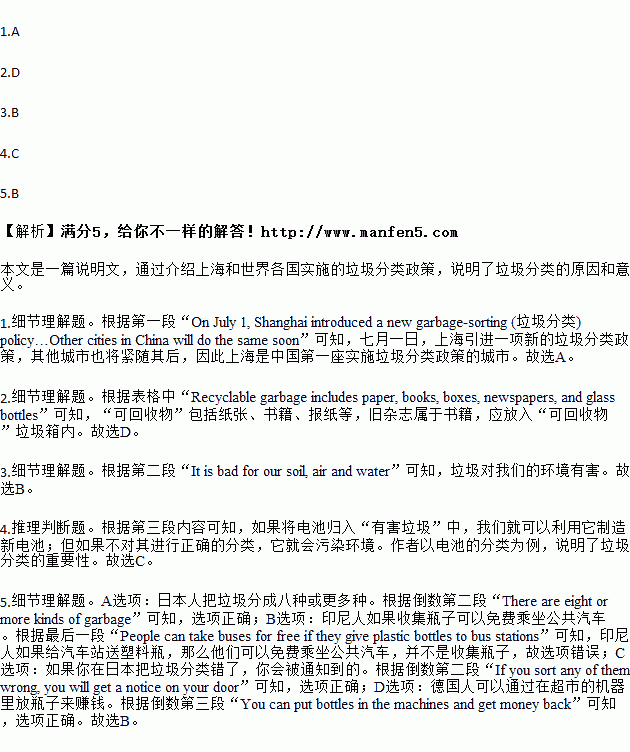题目内容
Sort trash, save Earth
You might not think much about where your garbage goes. But now you might want to know. On July 1, Shanghai introduced a new garbage-sorting (垃圾分类) policy. People there need to put different kinds of garbage into different bins (垃圾箱). Other cities in China will do the same soon.
Four kinds of garbage in Shanghai
Recyclable garbage includes paper, books, boxes, newspapers, and glass bottles.
Harmful garbage includes lamps, batteries (电池), nail polish (指甲油), and other things with harmful chemicals.
Wet garbage usually comes from the kitchen, such as food, vegetables, flowers, leaves and eggshells.
Dry garbage is anything you cannot put into the other three bins. It includes pens, toilet paper, tape, hair, and towels (毛巾).
Why is garbage sorting a big problem? It’s because there is too much garbage these days. It is bad for our soil, air and water. Actually we can make use of some garbage again. And first, we need to sort our garbage.
For example, if you put an old battery into the “harmful waste” bin, people can use it to make new batteries. But if you don’t, the battery will end up somewhere else. Then, it will pollute the environment.
Can factories sort garbage for us? Yes, they can. But it takes many workers to do this and costs lots of money. If we all sort our own garbage, things will become much easier.
● Garbage sorting and recycling around the world.
Germany: There are big machines in supermarkets. You can put bottles in the machines and get money back. You can get one to two yuan per bottle. People like this because they can get money and protect the environment at the same time.
Japan: A trash truck comes to people’s doors to pick up their garbage. It plays music when it’s coming. There are eight or more kinds of garbage. If you sort any of them wrong, you will get a notice on your door.
Indonesia: People can take buses for free if they give plastic bottles to bus stations. An hour-long bus ride costs three large bottles, five medium (中等大小的) bottles or 10 plastic cups. But the bottles must be clean.
1.What can we learn from Paragraph 1?
A.Shanghai is the first city in China to make a garbage-sorting policy.
B.China is the first country in the world to make a garbage-sorting policy.
C.Many other cities in China have garbage-sorting policies.
D.Many people don’t like Shanghai’s garbage-sorting policy.
2.Which bin should we put the old magazines into in Shanghai?
A.Dry garbage bin. B.Harmful garbage bin.
C.Wet garbage bin. D.Recyclable garbage bin.
3.From Paragraph 2, we know that________.
A.sorting garbage is easy B.garbage is bad for the environment
C.all garbage is recyclable D.we should recycle garbage at first
4.With the battery example, the writer tries to tell us________.
A.how to sort our garbage
B.what harmful garbage is
C.the importance of sorting our garbage
D.the difficulty of sorting our garbage
5.Which of the following is NOT true according to the passage?
A.Japanese sort their garbage into eight or more kinds.
B.People in Indonesia can take buses for free if they collect bottles.
C.If you sort garbage wrong in Japan, you will be noticed.
D.Germans can get money by putting bottles in the machines in supermarkets.
 天天向上一本好卷系列答案
天天向上一本好卷系列答案 小学生10分钟应用题系列答案
小学生10分钟应用题系列答案
